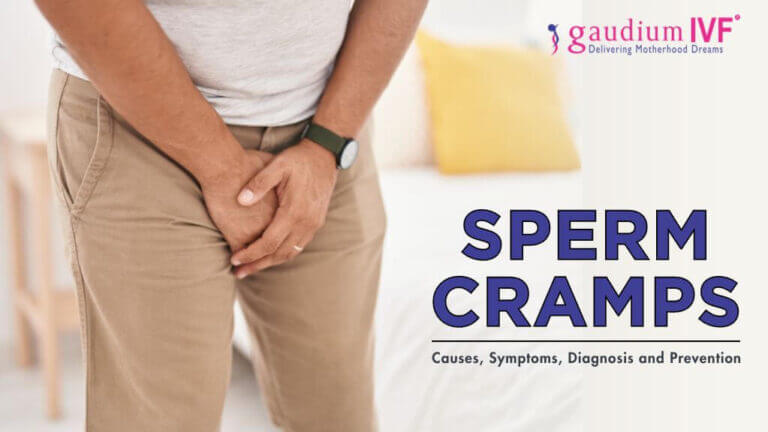
Each person’s body reacts distinctively to sexual arousal and orgasm. While some find pleasure and relief in these experiences, others may experience pain and discomfort, specifically in the testicles. Referred to medically as post-orgasmic pain syndrome (POPS), semen cramps characterize the painful response that some men encounter post-ejaculation.
From a medical perspective, “sperm cramps” denotes a condition known as testicular pain or discomfort, typically emerging after ejaculation. The discomfort manifests as either a lingering ache or cramping sensation localized in the testicles or the surrounding region. In this blog with Gaudium IVF, the best IVF center in Bangalore, we will delve into more intricate details of sperm cramps.
Sperm Cramps Causes
The extent of sperm cramps ranges from mild discomfort to prolonged, severe pain lasting hours or even days. While the exact cause remains unknown, prevalent factors linked to male infertility include infections such as:
Epididymitis or urinary tract infections, lead to pain or cramping in the reproductive organs.
Testicular issues like torsion or varicocele can contribute to discomfort during ejaculation. Additionally, heightened muscle tension or excessive contractions during sexual activity may result in cramps.
Prostate-related problems, such as prostatitis or an enlarged prostate, can lead to discomfort or pain during ejaculation.
Post-orgasmic illness syndrome (POIS), a rare condition, presents various symptoms like muscle aches and fatigue following ejaculation.
Various influences contribute to sperm cramps, including psychological factors like anxiety, stress, and depression, along with physical factors like prolonged abstinence, vigorous sexual activity, and hormonal imbalances. Understanding these causes aids in recognizing symptoms associated with male infertility.
Male Cramps symptoms
Sperm cramps manifest as a sharp or dull pain in one or both testicles post-ejaculation, displaying a spectrum of complexity and varying severity. Some individuals also report discomfort in the groin, lower abdomen, or perineum. In severe instances, the pain extends to the back or legs, impacting mobility. Early diagnosis and prompt precautions are crucial to mitigate potential issues like male infertility. Sperm cramp symptoms are categorized into psychological and physical factors.
Psychological factors encompass sexual performance anxiety, increased stress, psychological trauma, and psychosomatic elements.
On the physical side, symptoms include pelvic pain, abdominal pain, pain during sex, inflammatory diseases, structural abnormalities, and complications like the accumulation of sperm or issues with the ejaculatory duct. Recognizing and addressing these factors promptly is essential for comprehensive male reproductive health.
Diagnosis of Sperm Cramps:
Diagnosing sperm cramps typically relies on a comprehensive evaluation of symptoms and the patient’s medical history. A crucial step involves a thorough physical examination to exclude conditions like testicular torsion or epididymitis. Depending on the severity of symptoms, a fertility expert may advise additional diagnostic measures, including Ultrasound, MRI, and CT scans, to scan the internal structures of the testicles.
Furthermore, the diagnosis of sperm cramps is facilitated through a multi-faceted approach. The fertility expert gathers valuable insights from the patient’s medical history, identifying potential contributing factors. A meticulous physical examination helps in assessing the nature and extent of symptoms. Additionally, diagnostic tests play a pivotal role, offering a more in-depth understanding of the condition. This combined approach ensures a comprehensive evaluation, enabling the fertility expert to accurately diagnose sperm cramps and tailor suitable interventions to address the underlying causes.
Prevention/Treatment of Sperm Cramps:
To naturally prevent and treat sperm cramps, incorporating lifestyle changes is paramount. Wearing supportive underwear, managing stress levels, and clear communication with your partner are effective preventive measures. Ensuring adequate hydration contributes significantly to avoiding sperm cramps. Additionally, addressing emotional concerns and avoiding alcoholic beverages and tobacco further enhance these preventive steps. Stress management techniques, such as mindfulness or relaxation exercises, can positively impact reproductive health.
Conclusion: For any fertility concerns, including sperm cramps, you can rely on Gaudium IVF, the best IVF center in Bangalore. Our fertility experts examine reproductive health with a personalized approach, creating a comfortable environment for discussing complications. As India’s best fertility chain, Gaudium IVF employs cutting-edge technology and modern scientific methods to address every fertility issue.



